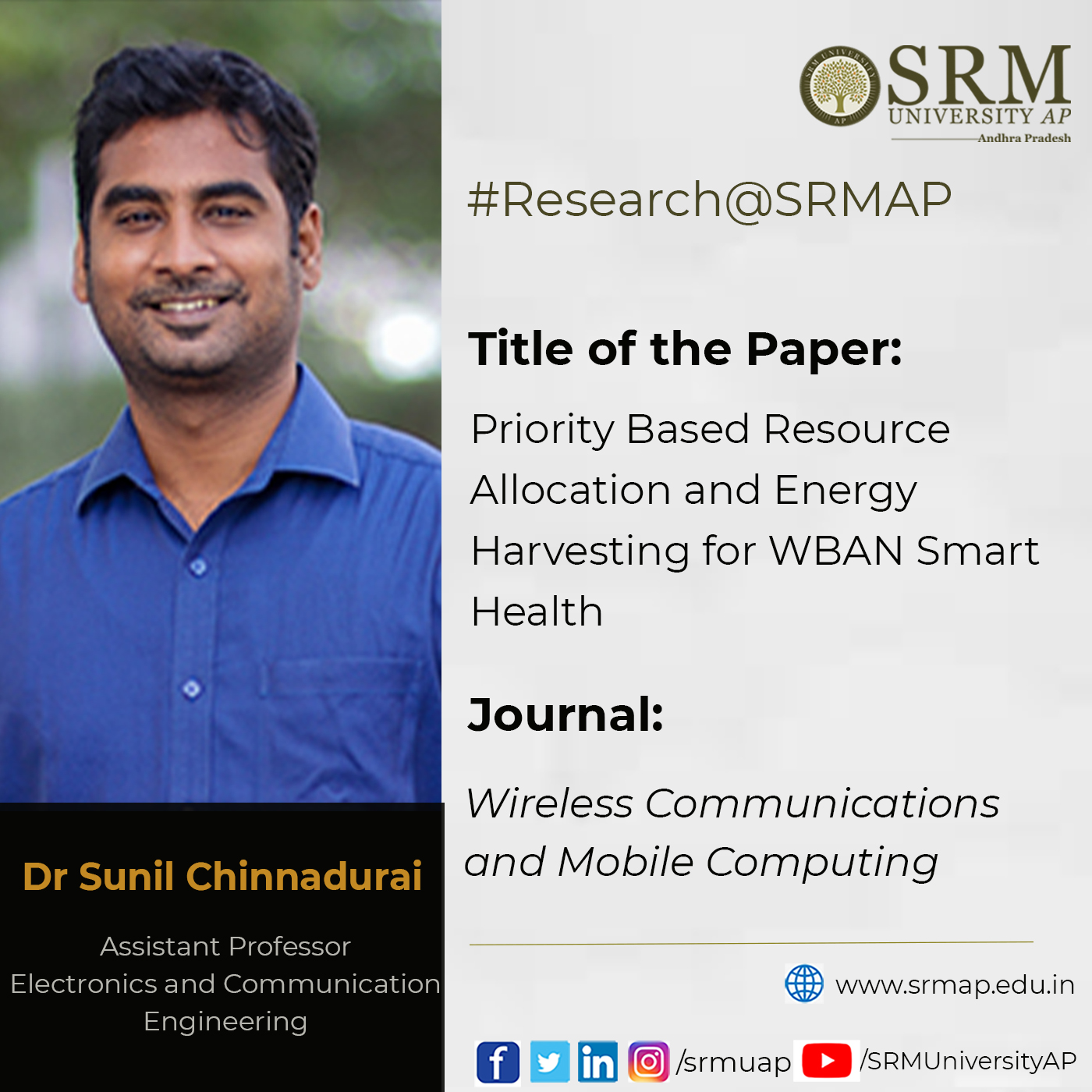 Integrated short-range wireless technologies are becoming the most sought-after machinery in recent years. The possibilities of its applications are expanding with the emergence of new health conditions and concerns. Assistant Professor of the Department of Electronics and Communication Engineering, Dr Sunil Chinnadurai’s recent research focuses on the future of this technology. His paper titled Priority Based Resource Allocation and Energy Harvesting for WBAN Smart Health got published in the journal Wireless Communications and Mobile Computing with Impact Factor 2.34. He worked with Dr Poongundran Selvaprabhu, Assistant Professor, Vellore Institute of Technology, for this project.
Integrated short-range wireless technologies are becoming the most sought-after machinery in recent years. The possibilities of its applications are expanding with the emergence of new health conditions and concerns. Assistant Professor of the Department of Electronics and Communication Engineering, Dr Sunil Chinnadurai’s recent research focuses on the future of this technology. His paper titled Priority Based Resource Allocation and Energy Harvesting for WBAN Smart Health got published in the journal Wireless Communications and Mobile Computing with Impact Factor 2.34. He worked with Dr Poongundran Selvaprabhu, Assistant Professor, Vellore Institute of Technology, for this project.
Abstract
With the emergence of new viral infections and the rapid spread of chronic diseases in recent years, the demand for integrated short-range wireless technologies is becoming a major bottleneck. Implementation of advanced medical telemonitoring and telecare systems for on-body sensors needs frequent recharging or battery replacement. This paper discusses a priority-based resource allocation scheme and smart channel assignment in a wireless body area network capable of energy harvesting. The project investigates the researcher’s transmission scheme in regular communication, where the access point transmits energy and command while the sensor simultaneously sends the information to the access point. A priority schedule non-pre-emptive algorithm to keep the process running for all the users to achieve the maximum reliability of access by the decision-maker or hub during critical situations for users has been proposed. During an emergency or critical situation, the process does not stop until the decisionmaker, or the hub takes a final decision. The objective of the proposed scheme is to get all the user processes executed with minimum average waiting time and no starvation. By allocating a higher priority to emergencies and on data traffic signals such as critical and high-level signals, the proposed transmission scheme avoids inconsistent collisions. The results demonstrate that the proposed scheme significantly improves the quality of the network service in terms of data transmission for higher priority users.
Explanation of the research
A priority scheduling non-pre-emptive algorithm with SCA for WBAN smart health is proposed. The potential advantage of this algorithm is to keep on running the process for all users to attain maximum reliability until all the processes are executed. The data traffic associated with the priority scheduling non-pre-emptive algorithm is categorised into four major sub classes, namely, emergency, on-demand, normal, and non-medical data signals in order to assist the different QoS requirements. The results indicate that the priority scheduling non-pre-emptive algorithm performs during emergency and on-demand signals compared to the novel priority-based channel access algorithm for contention-based MAC (NPCA-MAC), low-rate wireless personal area networks (LR- WPAN), and priority-based adaptive schemes.
WBAN is a precise technology requiring frequent recharging or battery replacement. During the emergency or critical rescue situation, the highest priority user information is processed with minimum service delay without compromising the QoS. In addition, the proposed method prioritises the sensor nodes and classifies data traffic into emergency- (highest priority-), on-demand- (minimum priority-), normal (lowest priority-), and nonmedical- (normal-) based applications.
The future directions of WBAN are dealing with smart WBAN healthcare, trust management, trust negotiation, data security, uninterrupted lifetime, and intelligent decision-making (enhance the predictions from prior information) processes.

